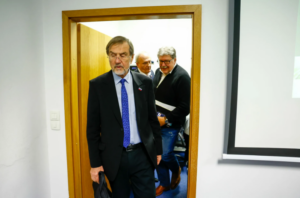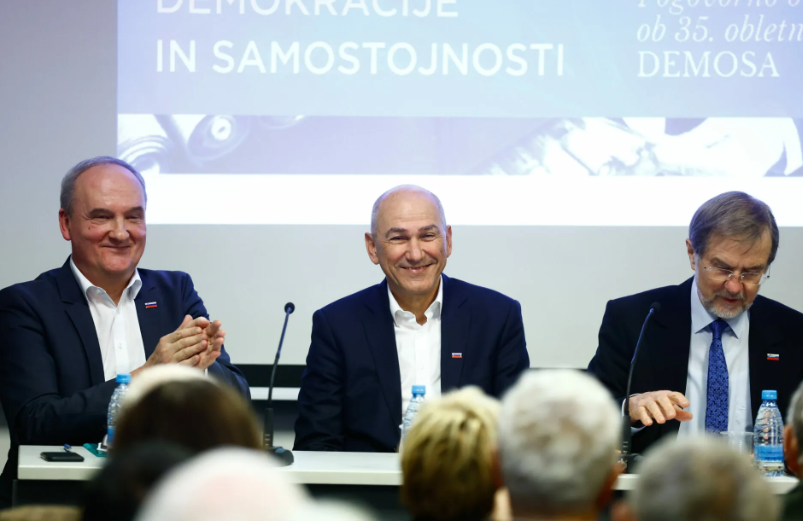On the occasion of the 35th anniversary of the founding of the Democratic Opposition of Slovenia – DEMOS party (Demokratična opozicija Slovenije), the Association for the Values of Slovenian Independence (Združenje za vrednote Slovenske osamosvojitve – VSO) organised a panel discussion at which the panellists stressed the importance of political cooperation and the recognition of this great historical moment. The fact that almost nobody knows about DEMOS today is due to the fact that DEMOS was an opponent of the former totalitarian system. It carried out the process of Slovenia gaining its independence without the participation of the communist heavyweights.
Lojze Peterle, the first Prime Minister of Slovenia, said that the DEMOS party replaced the revolutionary political paradigm with a democratic one and thus truly brought freedom to Slovenia, as the Constitutional Court judges said years ago. “Soon after independence, however, we fell victim to the embarrassing fact that independence was not a project of the party. This is why today, there is a relativisation of independence and DEMOS happening, with the emphasis being placed on the National Liberation Movement (NOB) instead.”
The old forces soon took power again – namely, the Liberal Democracy of Slovenia party (Liberalna demokracija Slovenije – LDS), led by Janez Drnovšek, took power. At least a semblance of democratisation was happening until 2008, when the first truly spring government ended its mandate with great success. But then came the time period, when participation was forbidden, even if it harmed the country. Dr Dimitrij Rupel, the first Minister of Foreign Affairs of the independent Republic of Slovenia, said that since 2008, we have been watching a ‘friendly fire’ in Slovenian politics. “In a recent statement, Milan Kučan rejected the possibility of cooperation between the left and the right, which means a party war or an escalation of the political situation.”

Janez Janša, who served as the Minister of Defence at the time of independence, said that the torture of gaining support for independence was incredible. The Communists had blocked all attempts at successful independence. Janša pointed out at the panel discussion that the government had submitted a budget in October 1990 and adopted it in March 1991. “After six months of agonising debates, insults and deadlocks, which delayed the preparations for the implementation of the commandments given by the Slovenian people in the independence referendum.”
Unfair elections
The reason for this was unfair elections. The Communist Party rigged the elections so that it retained at least a third of the decision-making power in the Assembly. This was not the case in other countries of the former Yugoslavia; the party branches were simply abolished. “In Croatia, the Assembly of United Labour was automatically abolished at the first elections, but we still had it. This ensured that the party would win the elections without universal suffrage,” Janša pointed out. These elections did not meet three of the five criteria of the then-Conference on Security and Cooperation in Europe. There were also many irregularities in the elections – DEMOS observers were chased out of polling stations by Communist cadres as the counting of votes began. The results are, therefore, still questionable today.
Despite all these problems, the 1990 elections were the first time Slovenians got their own government – a government of the Slovenian people. This government did not have all the chances it should have, but at least it was ours. For the first time in history, it was the DEMOS political force that had a clear programme for independence – to make our own Slovenian state. In addition to the programme, it also had power, the government and institutions, despite the fact that these were penetrated from all sides by the communists, Igor Bavčar stressed.
Young people don’t know anything about DEMOS
But the story of DEMOS is not told anymore today. Young people do not know what DEMOS is, they know nothing about independence, they do not know the ministers, and they know nothing about the war for Slovenia. Why? Because this was the most important national project in history, and the Communists were not part of it, as Janez Podobnik, a member of the first convocation of the National Assembly, said at the panel.
As Janša said, we are still fighting for the same things today as we did in 1990, and the key is to organise ourselves, to go among the people and motivate our fellow citizens for a better homeland. “It does not help if someone is merely whining in corners and pubs and not organising,” he stressed.
We have gained our independence, and now, we must also win our freedom
The 35th anniversary of DEMOS tells us a lot, especially since we see the complete absence of any national celebrations in honour of this turning point in the political history of the Slovenian nation. It tells us everything we need to know about our times. The Communists have succeeded in erasing history. It is, therefore, now time to resist this forgetting and put independence where it belongs – we must put it first.
A.G.


